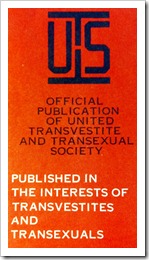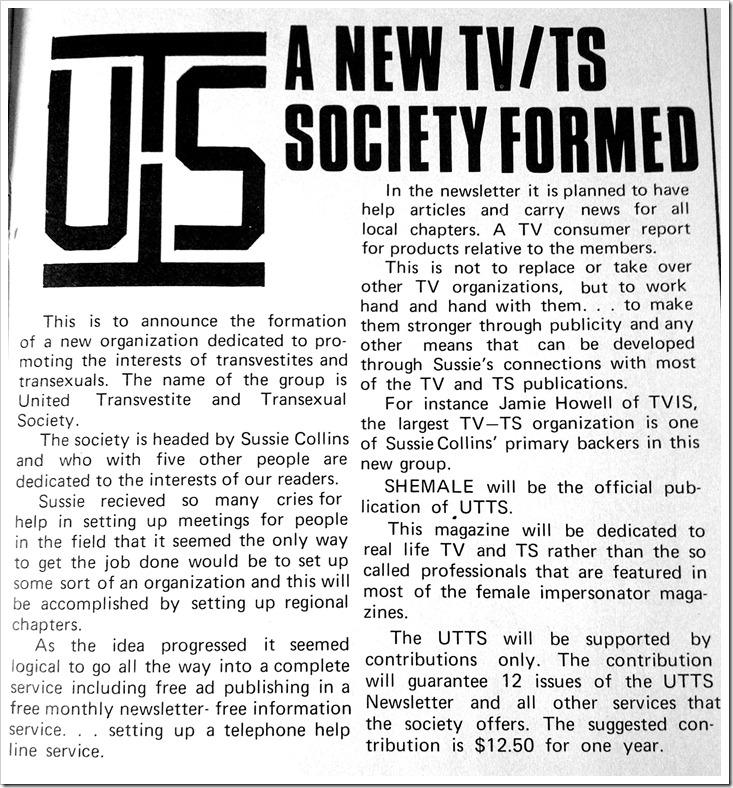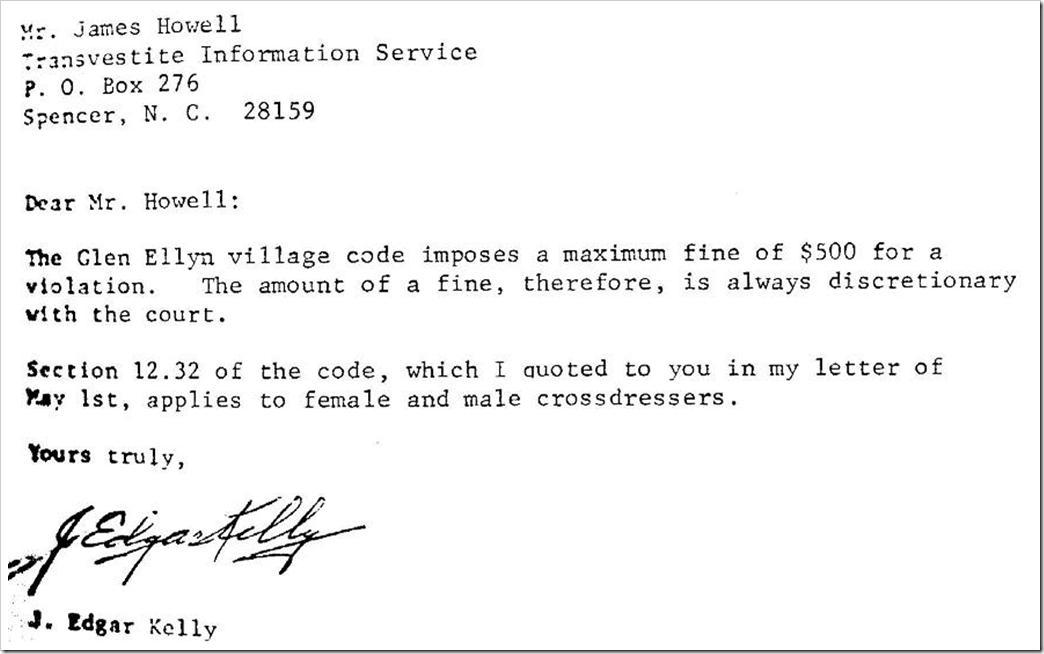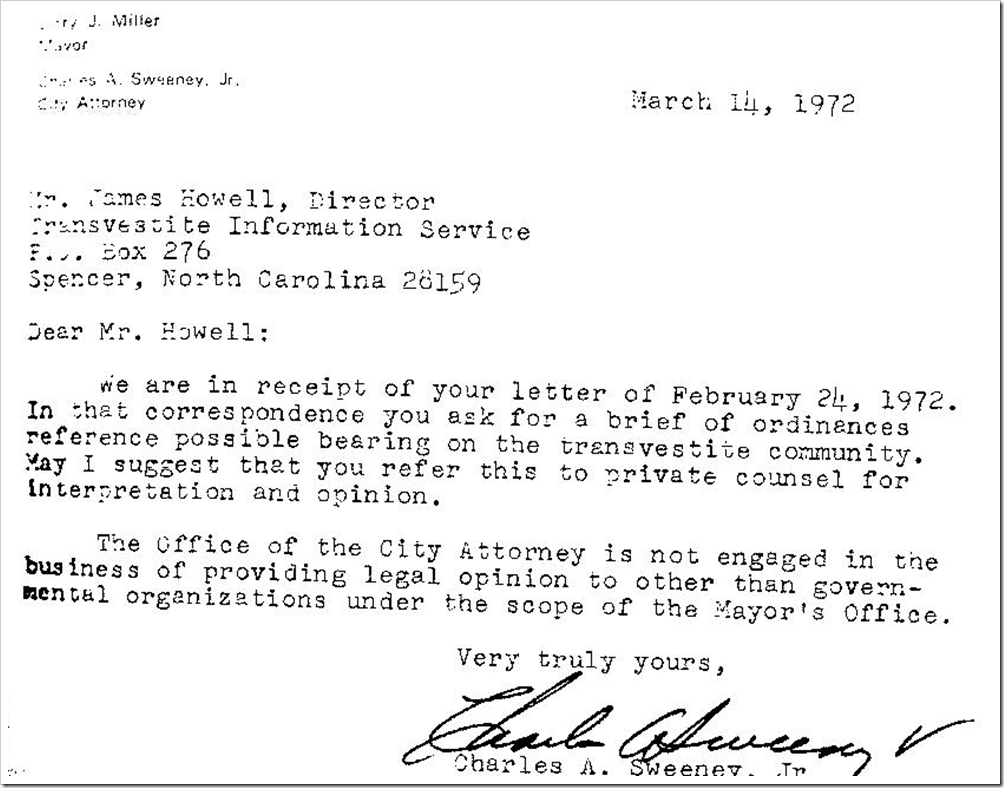In the 1970s and early 80s, we referred to our community as the “gender community” and nowadays we refer to it as the “transgender community.” In what ways, if any, were these two substantially different? The various posts I’ve recently made seeks to shed light on this question.
As I’ve said before, the modern incarnation of the alliances between various types of trans folks (which we currently refer to as being the transgender community) came from somewhere and if we choose to look, over and over again we find that early transsexual leaders, organizations and coalitions were forming the very narratives some blame non-transsexuals for inventing decades before the 1990s.
Consider what the United Transvestite and Transsexual Society (formed in 1973) had to say. As you’re reading the following announcement, remember that this was a national organization that helped give rise to a community of trans people that went on to pass their goals and values on to a later trans generation. While the terminology is certainly quaint and even offensive by today’s standards, try to focus on the message and compare that message to the things you hear in the modern transgender community. As someone who is interested in the evolution of our current community, the views, goals and values of this early national organization are certainly interesting to me.
A New TV/TS Society Formed
This is to announce the formation of a new organization dedicated to promoting the interests of transvestites and transexuals. The name of the group is United Transvestite and Transexual Society.
The society is headed by Sussie Collins and who with five other people are dedicated to the interests of our readers.
Sussie received so many cries for help in setting up meetings for people in the field that it seemed the only way to get the job done would be to set up some sort of an organization and this will be accomplished by setting up regional chapters.
As the idea progressed it seemed logical to go all the way into a complete service including free ad publishing in a free monthly newsletter – free information service… setting up a telephone help line service.
In the newsletter it is planned to have help articles and to carry news for all local chapters. A TV consumer report for products relative to the members.
This is not to replace or take over the other TV organizations, but to work hand and hand with them… to make them stronger through publicity and any other means that can be developed through Sussie’s connections with most of the other TV and TS publications.
For instance, Jamie Howell of TVIS, the largest TV – TS organization is one of Sussie Collins’ primary backers in this new group.
SHEMALE will be the official publication of UTTS.
This magazine will be dedicated to real life TV and TS rather than the so called professionals that are featured in most of the other female impersonator magazines.
The UTTS will be supported by contributions only. The contribution will guarantee 12 issues of the UTTS Newsletter and all other services the society offers. The suggested contribution is $12.50 for one year.
Today, terms such as “shemale” and “transvestite” are largely regarded as porn industry buzz words and are generally seen as offensive when used to describe trans people today in America. However, 40 years ago, these terms were commonly used in the American trans community. It’s likely (if history is any indicator) that many of the terms we currently use will be seen as quaint, inaccurate and possibly offensive 40 years from now.
Instead of focusing on outdated terminology, consider the explicit inclusionary vision and goals this national organization had. Consider that while this national organization was forming, there was already another national “TV – TS organization”. Note how this more established organization gave rise to UTTS. How are these very qualities of community reflected in the current trans community?
Yesterday’s gender community is the root of today’s transgender community. When debating the values, goals and aims of the allied groups of people who are of a non-cisgender history, experience and/or expression, it’s simply not useful to shift all blame and/or credit for our current values, goals and aims away from the transsexual community. Today’s community evolved from yesterday’s community – a community that transsexuals were certainly co-architects of.
More on the evolution of a community…
In this 1973 notice, Jamie Howell was referenced as being a significant supporter of UTTS. This provided me with an interesting example of how the various constituent groupings of gender diversity have worked in collaboration to form what is nowadays known as the “transgender community”.
On February 14, 1971, Howell formed the Transvestite Information Service (TVIS) with the support of Reed Erickson Foundation. Reed Erickson, an FTM transsexual, personally approved each new group his Foundation supported. This transsexual-backed organization was one of the first to do some practical research on behalf of the community. For instance, TVIS conducted the first ever national and international survey of local crossdressing ordinances:
While some jurisdictions stonewalled Howell, many did not and our community’s first legal database was created and shared with all trans people.
This is but another historical examples of the evolution of our community:
- Transsexuals supported the creation of a “TV – TS organization”;
- This organization went on to create a valuable resource that benefited all trans people;
- This organization then went on to help start a new national trans organization with the goal of bringing the various local trans groups together.
UTTS went on to form other groups throughout the nation and supported to the Transsexual Action Organization (TAO), which later became an international support organization for transsexual people. TAO went on to inspire Stephen Whittle (another transsexual) to become a significant figure in the formation of the modern transgender community.
It is far too simplistic to argue that a “transgender Borg” took over the transsexual population. It’s also far too simplistic to argue that the transsexual community was there first to only then become colonized by non-transsexual people. These assertions are simply historically inaccurate and largely useless for anything more than creating internet drama.
Historical Document Disclaimer:
As I continue to publish historical documents relevant to the debates going on around the term transgender, I will include this disclaimer in hopes that it will cut down on having my position strawmaned to death.
The ideas found within the transgender community came from somewhere; they didn’t magically pop into existence on January 1, 1990. My intent in posting these historical documents is to dispel some historical inaccuracies some within the TS-not-TG group continue to popularize. I continuously find ideas that are purported to have originated within the so-called “transgender Borg”/“slave master” community sometime in the early 1990s and which was then supposedly thrust upon an unsuspecting transsexual community were in fact, championed by transsexuals leaders prior to 1990.
I find that I agree with practically everything those in the moderate TS-not-TG group claim with one major exception. Many assert that the “transgender umbrella” idea doesn’t refer to a group of unique allies who find unity in a common cause; rather, many in the TS-not-TG group simply assert that the term “transgender” robs all transsexuals of their unique experience. In fact, most transsexuals do not feel that the we should be segregated away from all of our allies in our continued fight for equality and, as these historical documents continue to reveal, transsexual people of history do not see a need to rip the transsexual community away from other communities to go it alone.
For a view that very closely resembles my own views on this issue, check out The Death of the “Transgender Umbrella” by Mercedes Allen. My reservations about this article are summed up nicely within the comment section by Dr. Jillian Weiss:
Great article, but you can’t create a movement to “not be transgender.” Critique is valuable, but by itself, it can only alter an existing movement, not build one of its own. Movements have to be for something. If we could create a viable “transsexual movement,” I’m for it. But it is unlikely that such a movement can occur at this point in time. Very unlikely. Although I agree with the idea on a theoretical basis, I don’t think it will ever go beyond talk.
So, if you take Allen’s article and combine it with what Weiss had to add, you’d have an almost perfect representation of my views concerning the TS-not-TG debate.




Your research is really fascinating, You should write a book about this.